It is definitely possible to camp for free Europe across Europe. Free camping, dry camping, wild camping and boondocking (all of which have slightly different meanings) are terms used to describe camping somewhere other than a paid campground. In most countries in Europe you can camp for free with a motorhome anywhere it is legal to park overnight. Free camping is usually not allowed (or is much harder to do) if you are sleeping in a tent or a trailer (known in Europe as a caravan).
We choose to free camp because it allows us to stay in unique places where we couldn’t stay otherwise (e.g. in the wilderness, at the beach, close to cities or attractions, or at any desirable stopping point along our journey). In some cases there is no campground available or conveniently located, or they’re not open (which is often the case when traveling out of season). We also choose to free camp to reduce costs. Campgrounds in Europe typically charge $20 – $45 a night for two people. On an extended journey, these costs really add up, so we try to spend multiple nights free camping for every night we spend in a campground.
In some places, free camping is illegal or discouraged. It may be against the national law (like in Greece where this rule is commonly ignored), local bylaws, or the sensibilities of the local residents or police. There may be signs restricting overnight parking or specifically RV parking. There are often height barriers on parking lots to prevent RVs (and particularly gypsy caravans) from entering a parking area, in which case we are forced to take our free camping and our business elsewhere.
There are several common ways to free camp in Europe.
Aires
Aires de Service (service areas) are places designated for the parking and servicing of RVs. They are very common in France and are available to a lesser extent in several other European countries (e.g. Germany, Spain, Italy, Portugal) Aires provide free or very cheap RV parking and often services like drinking water, grey and black water and garbage disposal, but rarely electricity. No trailers or tents are allowed. Items should not be set up outside one’s RV (e.g. no awnings, folding tables, chairs, or clothes lines.) Aires are usually provided by cities, towns, or businesses to encourage visitors and patronage. Provided a parking place for RVs also discourages visitors from parking overnight on the streets, and concentrates them in a particular area.
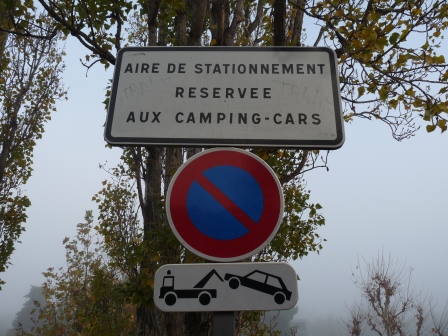
Aires are usually basic affairs — parking lots, paved or unsurfaced, with a service point where clean and dirty water can be on and off loaded. The service points are often custom-built, just a fresh water tap and access to the sewer. Sometimes the service points are commercially produced versions, which use money or tokens to gain access to the services. Most Aires are unmanned and the service points are sometimes in disrepair, which is made worse if some people dump their waste anyhow.
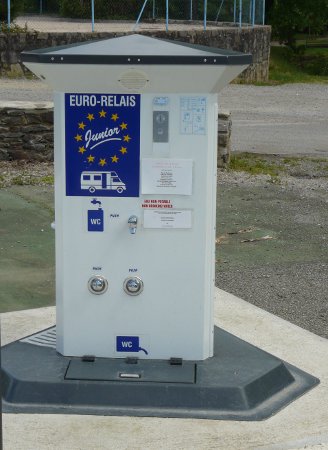
Aires rarely have the charm or the privacy of a national or state park campground. European commercial campgrounds almost never provide privacy anyhow, so they aren’t much different in that regard. Aires provide hassle-free parking that is often close to cities, attractions, or beaches, and a place to service one’s RV.
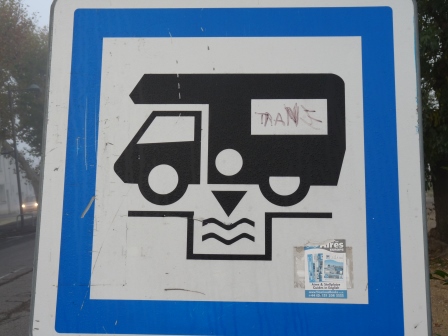
There are web sites and books that identify and describe the thousands of Aires available in Europe. As a traveler, it’s useful to have all the information you can get when trying to find a place to stay.
Urban Camping
The main advantage of staying in an urban setting is proximity to attractions, restaurants, and nightlife. It’s nice to be able to walk to the city center. It’s great to be able to enjoy a night on the town without worrying about driving or transport back to a campground.
When staying somewhere other than an official overnight camping place, it is important to choose wisely. In the city, it’s important to blend in, typically some place where other vehicles are parked like a truck stop, commercial parking lot, residential neighbourhood, etc. Ideally it will be a place with good lighting and people nearby (for safety reasons) but no noisy or nosy neighbours, loud traffic or pedestrians, nor trucks running their refrigeration units all night. In some countries like Germany, Austria, and France it is safe to sleep at the roadside rest stops, but in other countries like Spain and Portugal this is ill advised as robberies sometimes occur.

If you choose your parking place wisely, remain in the vehicle, and don’t disturb anyone, only rarely will you be chased away. This has never happened to us. I’m sure it will be very disconcerting when we eventually get a knock on the door in the middle of the night. If this happens, it will hopefully be the police knocking. Being forced to move along could be a real problem if we’ve had a drink, and are therefore not in a position to safely drive away.
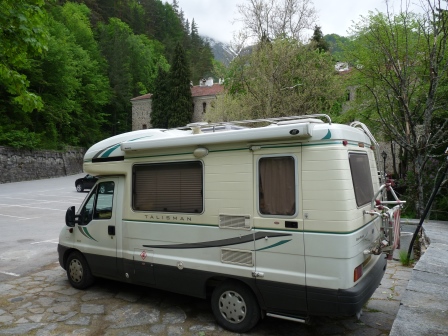
In urban camping situations, especially in places where it is questionable to stay, we try to arrive at or after dark so as not to draw attention to ourselves. We don’t exit the vehicle and camp in stealth mode with shades drawn and no external lights. Cocooned in the S&M Motel, we can enjoy a lovely evening, with a fine meal, a good book, or a movie on the laptop. In the morning the pressure is usually off as there are no issues with parking during the day. In some iffy situations it is best to depart early in the morning. Sometimes we’ll drive a short distance enjoying our coffee and tea before stopping somewhere nice for breakfast.
Wild Camping
Camping in the countryside or wilderness settings is a great way to get close to nature. It allows us to stay close to parks, mountains, beaches or other places of natural beauty and outdoor recreation.
In addition to campgrounds and aires, it is sometimes possible to stay on private land (e.g. farms, wineries, churches, monasteries, restaurant parking lots, etc.) In these cases permission should be obtained from the owner, which is sometimes difficult to do if they are not to be found or you don’t share a common language.
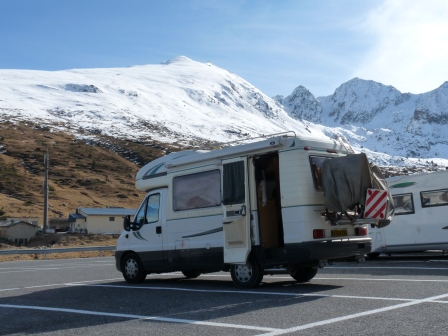
But wild camping is best done on public land away from civilization, in a quiet, remote place. Ideally this is near a lake, river, ocean, mountains, or other beautiful vista. There is nothing like free camping with the windows open, to wake with the sun rising over a beautiful landscape. We experienced this on a beach near Tarifa in Southern Spain, overlooking the Strait of Gibraltar. By day we walked the long sandy beaches of the Mediterranean and at night we enjoyed the lights of Tangier across the water in Morocco (Africa). We also stayed at the beach in several villages on the Peloponnese peninsula in Greece.
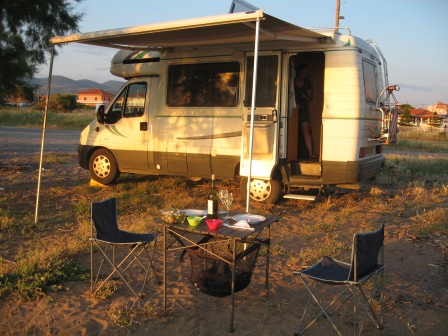
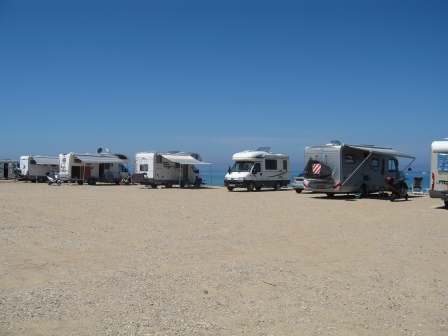
The biggest challenge with wild camp sites is how to find them. If you’re staying closer to civilization, it is necessary to find an out-of-the-way place, preferably a spot on a quiet side road or dead-end street that is obscured from view. In these conditions, you should try to keep a low profile by following the guidelines for urban camping above. You should not stay on private land without permission or you risk facing the wrath of the owner.

Sometimes we learn of wild camping locations from other people. They share this information in person or on the Internet. A more challenging way to find pristine wild camping spots it to scout them out oneself. A good approach is to seek out a body of water using maps or the GPS, then follow along it checking the side roads until you find a nice place. This is a skill that our friends Sue and Martin have mastered, and that we are still developing.
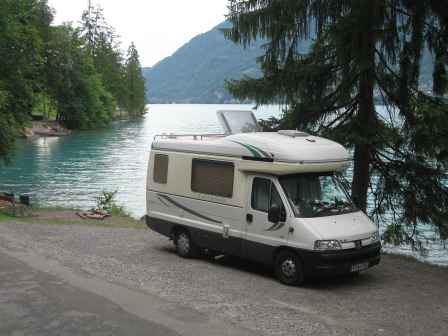
We did a lot more free camping in Phase 2 of our European adventure. The combination of more experience and warmer weather allowed us to stay in some amazing places and to lower our costs. And when we do get that knock on the door in the middle of the night, there will probably be a blog story in it.

Note — this is one of a continuing series of Friday posts about memorable events from recent travels that didn’t quite get finished while we were on the road.
Awesome idea but Next time without kids… Or when the older and wild boys want to stay in wild places. Staying with Frank’s international work buddies will help us.
At last I can look forward to fridays, still waiting for the boondocking info. Nice photos brining back nice memories.
Iam still attached to my feeble budget and not yet able to spread my wings, like you guys.
Just a note on your pictures: Nazaré (the same place where Mc Namara rode the biggest wave ever) is a place in Portugal, not France. The place where you took the picture is called “Sítio”. Keep posting.
wild camping gets interesting when the parking spot is also a dogging area. I thought I knew my wife after 20 years of marriage…
I have read numerous times that Aires in France can be a bit on the dodgy side, security-wise. About ten years ago, my family and I stopped in a few of them, but I don’t know nowadays… Have you had any recent experience with them?
the last photo says it was taken in nazare, france but i think it is nazare in Portugal…
Any tips on Switzerland? Is it easier or more difficult than the above?